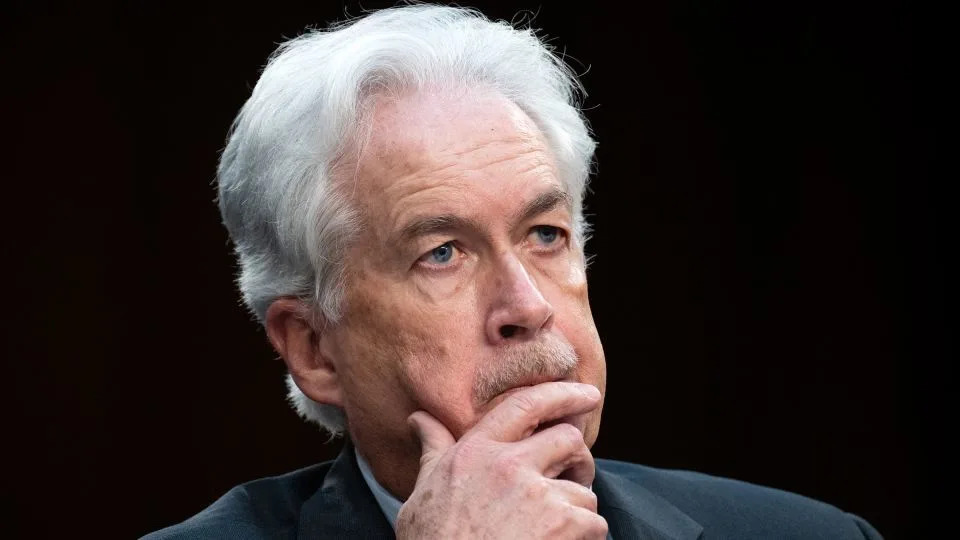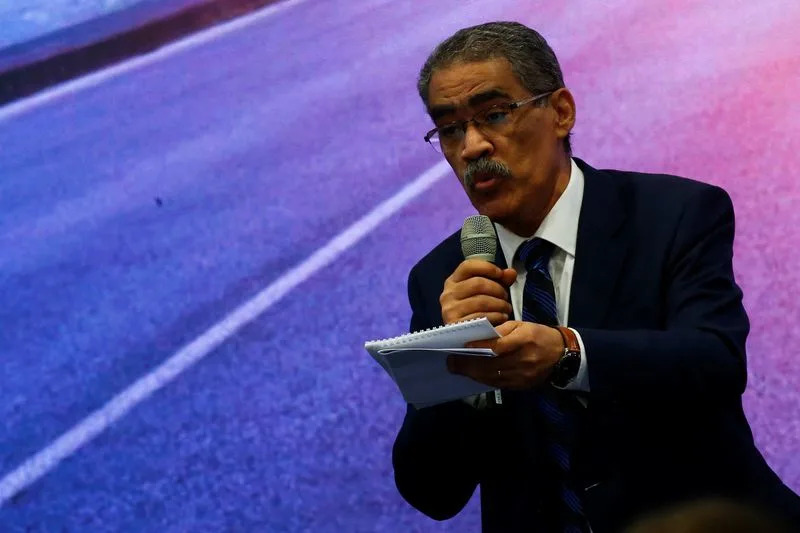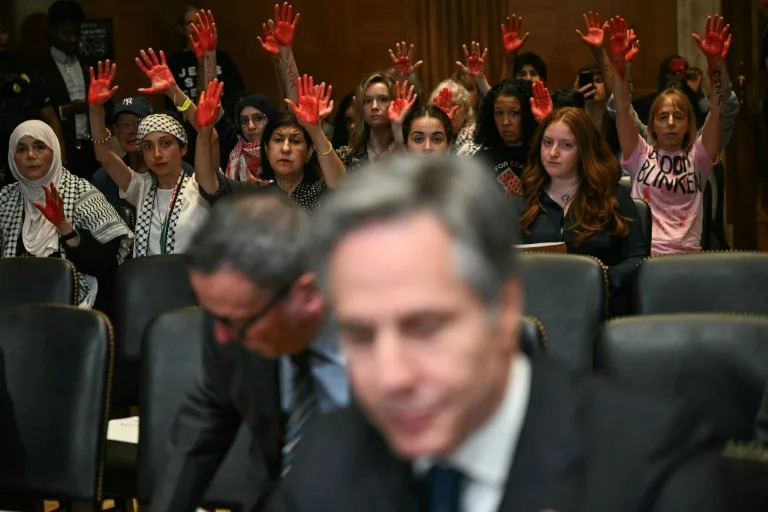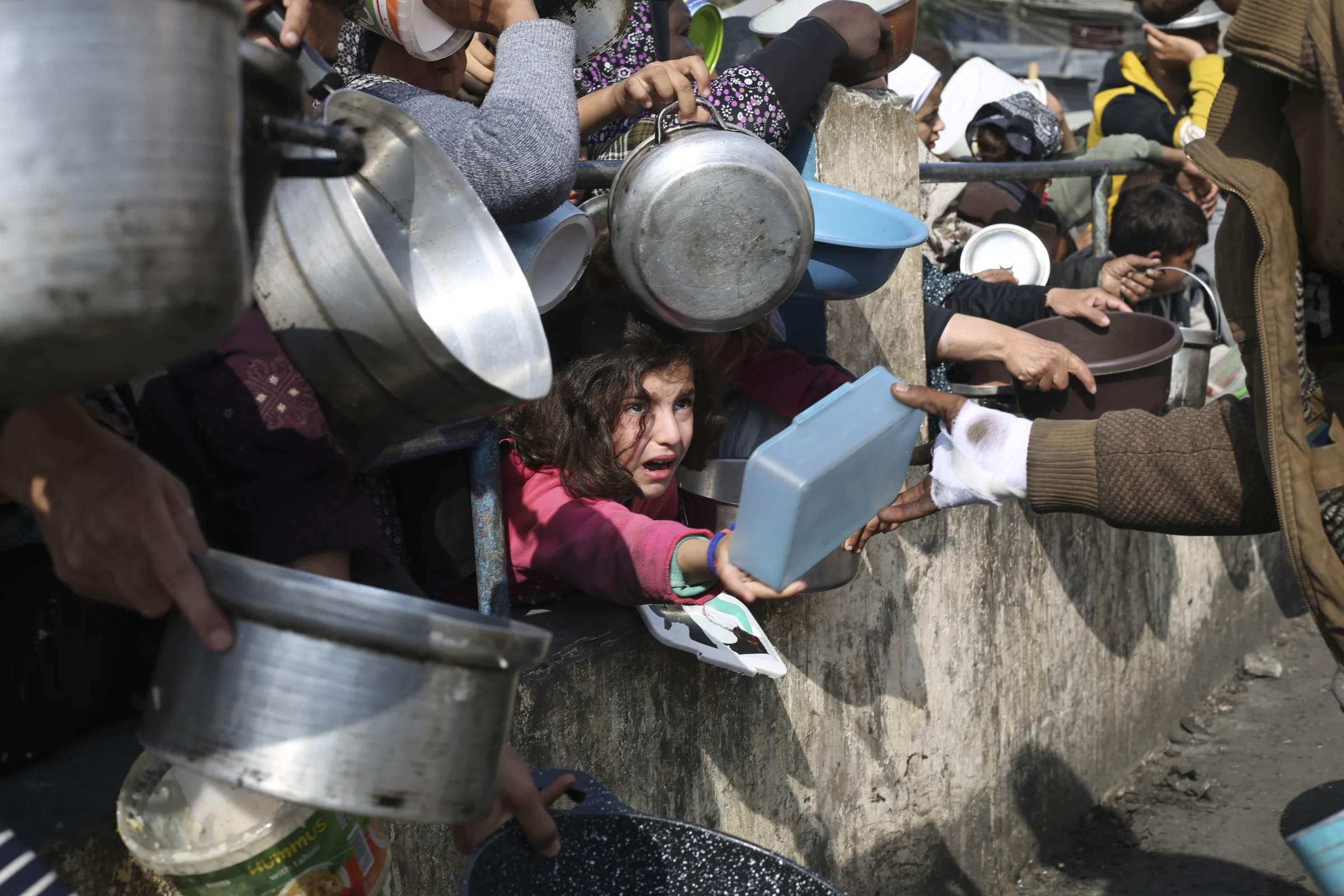Egypt's prime minister attends a news conference to announce the Egyptian state's vision to deal with the global economic crisis in Cairo.
Egypt threatened on Wednesday to withdraw as a mediator in Gaza ceasefire negotiations after CNN reported that Egyptian intelligence changed terms of recent truce proposal and scuttled a deal.
"Attempts to cast doubt and offend Egypt's mediation efforts... will only lead to further complications of the situation in Gaza and the entire region and may push Egypt to completely withdraw from its mediation in the current conflict," Diaa Rashwan, head of Egypt's State Information Service, said in a statement published on social media.
Quoting three people familiar with the discussions, CNN on Tuesday said Egyptian intelligence changed terms of a ceasefire proposal that Israel agreed to earlier in May.
When Hamas announced on May 6 that it accepted the agreement, it was not the proposal that fellow mediators from the U.S. and Qatar thought was submitted to Hamas for review, according to CNN.
Get AfriPrime Android Web View app....Click the link to Amazon app store to download https://rb.gy/3xek46
The changes made by Egyptian intelligence caused anger and recrimination among U.S., Israeli and Qatari officials and caused an impasse in the talks, the CNN report said.
The CIA, whose director, William Burns, has been leading the U.S. mediation efforts, declined to comment on the report.
Rashwan said in the statement that Cairo's participation as a mediator resulted from "repeated requests and insistence" from Israel and the U.S.
Egypt said some "parties" recently directed blame towards Egyptian and Qatari mediators and accused them of being biased, he added.
Tensions have been growing between Egypt and Israel over the Israeli military operation in Rafah at the southern end of the Gaza Strip, just across the border from Egypt.
Since the war between Israel and Hamas began on Oct. 7, Egypt has expressed concern that Israel's campaign could push residents of the Palestinian enclave across its border, where it has bolstered security.
Egypt changed terms of Gaza ceasefire deal presented to Hamas, surprising negotiators, sources say
Egyptian intelligence quietly changed the terms of a ceasefire proposal that Israel had already signed off on earlier this month, ultimately scuttling a deal that could have released Israeli hostages and Palestinian prisoners, and set a pathway to temporarily end the fighting in Gaza, according to three people familiar with the discussions.
The ceasefire agreement that Hamas ended up announcing on May 6 was not what the Qataris or the Americans believed had been submitted to Hamas for a potential final review, the sources said.
The changes made by Egyptian intelligence, the details of which have not been previously reported, led to a wave of anger and recrimination among officials from the US, Qatar and Israel, and left ceasefire talks at an impasse.
“We were all duped,” one of those sources told CNN.
CIA Director Bill Burns, who has spearheaded the American efforts to broker a ceasefire agreement, was in the region when word reached him that the Egyptians had changed the terms of the deal. Burns was angry and embarrassed, the same person said, believing it made him look like he wasn’t in the loop or hadn’t informed the Israelis of the changes.
Get AfriPrime Android Web View app....Click the link to Amazon app store to download https://rb.gy/3xek46
The soft-spoken and mild-mannered Burns “almost blew a gasket,” said the source.
A CIA spokesperson declined to comment.
The three sources familiar with the matter told CNN that a senior Egyptian intelligence official named Ahmed Abdel Khalek was responsible for making the changes. Abdel Khalek is a senior deputy to the Egyptian intelligence chief Abbas Kamel, who has been Burns’ counterpart in leading Egypt’s mediation in the ceasefire talks.
One source familiar with the negotiations said Abdel Khalek told the Israelis one thing and Hamas another. More of Hamas’ demands were inserted into the original framework that Israel had tacitly agreed to in order to secure Hamas’ approval, the source said. But the other mediators were not informed; nor, critically, were the Israelis.
“Hamas was telling their people, ‘We will have a deal in place tomorrow,’” the first source said.
“All sides were under the assumption the Egyptians provided the same document” that Israel had signed off on and the other mediators, the US and Qatar, were aware of, the person said.
Instead, the second source said, the Egyptians sought to blur the lines between the original framework and Hamas’s response.
In response to a request for comment from the Egyptian government, a senior Egyptian source told CNN after the story was published: “Some parties play a game of accusing the mediators, blaming and accusing them of bias in order to evade making the required decisions. Egypt is surprised by the attempts of some parties to deliberately insult the Egyptian efforts to reach a ceasefire in Gaza.”
Diaa Rashwan, the head of Egypt’s State Information Services, then issued a lengthy response calling the story “wrong” and “devoid of any information or facts,” without offering specifics.
“The ongoing attempts to cast doubt and insult the Egyptian mediation efforts and roles, with allegations that contradict reality, will only lead to further complicating the situation in Gaza and the entire region, and may push the Egyptian side to take a decision to withdraw completely from their mediation role in the current conflict,” Rashwan said in a statement.
A deal was close at hand
A Hamas document obtained by CNN outlining the version of the framework they agreed to included achieving a permanent ceasefire and a “sustainable calm” to be reached in the second phase of the three-stage deal. Israel has been averse to agreeing to discuss an end to the war before Hamas has been defeated and the remaining hostages are released from captivity.
Now, three weeks later, with ceasefire talks stalled, those involved are raising questions about the motives of Egypt, which for years has served as a key intermediary between Israel and Hamas, particularly Hamas members inside Gaza.
Asked by CNN’s Jake Tapper on Tuesday if he was concerned about Egypt being involved with future ceasefire talks, Israeli Prime Minister Benjamin Netanyahu said that Israel was not prepared to agree to terms that would allow Hamas to attack Israel again. “I hope Egypt understands that we can’t agree to something like that.”
Get AfriPrime Android Web View app....Click the link to Amazon app store to download https://rb.gy/3xek46

The changes came more than a week after a team of Egyptian negotiators flew to Israel in late April to hammer out some of the final details of a framework to provide for the release of Israeli hostages in exchange for a pause in fighting and the return of Palestinian prisoners.
Talks had been ongoing for months by then, since the last pause in the fighting fell apart in early December. With Israel agreeing for the most part to go farther than they previously had, there was a creeping sense of optimism taking hold that a deal was close at hand. Israel appeared willing to accept fewer hostages, release more Palestinian prisoners and allow Gazans in the southern part of the enclave to return home to the north unrestricted.
US officials emphasized how “extraordinarily generous on the part of Israel” the framework was, in the words of US Secretary of State Antony Blinken.
After discovering the Egyptian freelancing, Qatari Prime Minister Mohammed bin Abdulrahman bin Jassim Al Thani informed Israel’s intelligence service Mossad that Egypt had acted alone, two of the sources told CNN.
Al Thani and CIA Director Burns got to work trying to salvage the proposal and re-balance it with elements they knew Israel would require.
“It doesn’t make sense,” a senior Biden administration official said of why Egyptian intelligence would try to push something through without the essential input from the others.
Changes made to appeal to Hamas
After the Egyptians came back from Israel and conferred with Hamas, it became clear the group wouldn’t go along with what Israel was agreeing to, one of the sources said. So the Egyptian official made significant changes to get Hamas to agree.
The day before Hamas made their May 6 public announcement agreeing to the proposal, an Egyptian source told CNN that Egypt had received Hamas’ response and relayed it to the Israeli side.
“Several alternatives and scenarios were proposed to overcome the main point of contention related to ending the war,” said the source.
The agreement’s language about ending the war has been perhaps the thorniest issue throughout the negotiations. But what Hamas sent back, Netanyahu said, “was very far from Israel’s core demands.”
It wasn’t long before the discussions stalled.
Negotiators, including Burns, returned to Cairo for one more round of indirect talks with Hamas. Israel agreed to send a team, as did Qatar, but neither sent senior officials, an indication that despite earlier optimism a deal would not be as imminent as hoped.
Get AfriPrime Android Web View app....Click the link to Amazon app store to download https://rb.gy/3xek46

Two days after Hamas’ response on May 6, Burns returned to Washington and sources told CNN the talks were “paused.”
Mediators had hoped that a pause in the fighting would delay or even prevent a serious incursion into Rafah by Israel. Military operations by Israel in Rafah are now expanding despite protest by the Biden administration that they will threaten the hundreds of thousands of civilians who had fled there for safety.
If talks resume, it’s expected that the Qataris would play a bigger role in the next round, the second source familiar with the negotiations said. A re-launch of the negotiations does not appear imminent but if it were to happen Egypt would still be expected to be central given their essential proximity to Hamas, as well as Israel’s preference of Egypt to Qatar.
The discussions would still be expected to center on a broad framework that would include an initial stage in which up to 33 Israeli hostages would be released over at least 6 weeks. Hamas has been pushing to include the bodies of dead hostages in the initial release and also have the first phase flow into a second with no break. Both are positions Israel has resisted.
US officials have argued that Hamas leader Yahya Sinwar doesn’t actually want a deal since he may think he’s winning and the greater the Palestinian suffering the more the world turns on Israel. Critics of Netanyahu, including families of Israeli hostages, have accused him of being more concerned with removing Hamas from Gaza than getting his citizens home.
Get AfriPrime Android Web View app....Click the link to Amazon app store to download https://rb.gy/3xek46
Blinken says Gaza truce still possible but set back by ICC move
Pro-Palestinian demonstrators hold up painted hands in protest as US Secretary of State Antony Blinken testifies before a Senate Appropriations subcommittee.
US Secretary of State Antony Blinken said Tuesday that a Gaza ceasefire deal was still possible but he charged that an International Criminal Court arrest bid for Israeli leaders was setting back diplomatic efforts.
Testifying before Congress, Blinken was repeatedly disrupted by protesters critical of US support for Israel. Several were evicted after shouting that he was a "war criminal," but protesters -- many showing symbolically reddened hands --were later allowed to sit silently behind him.
Blinken credited Qatar and Egypt with assisting the "extensive effort" to secure a temporary ceasefire between Israel and Hamas in return for the release of hostages.
But CIA Director Bill Burns, the US point man in the talks, left the region empty-handed some 10 days ago.
"I think we've come very, very close on a couple of occasions," Blinken told the Senate Foreign Relations Committee in the first of four appearances before Congress planned through Wednesday.
"We remain at it every single day. I think that there's still a possibility," Blinken said.
"But it's challenged by a number of events and I have to say, yes the extremely wrongheaded decision by the ICC prosecutor yesterday -- the shameful equivalence implied between Hamas and the leadership of Israel -- I think that only complicates the prospects for getting such an agreement," Blinken said.
Karim Khan, the prosecutor of the International Criminal Court, on Monday said he had applied for arrest warrants against Israeli leaders including Prime Minister Benjamin Netanyahu as well as Hamas chiefs.
Get AfriPrime Android Web View app....Click the link to Amazon app store to download https://rb.gy/3xek46
President Joe Biden called the move "outrageous" for putting together Hamas, which attacked Israel on October 7, and Israel, which has carried out a relentless military campaign in Gaza since then.
Republican lawmakers urged Biden to take action against the ICC. Previous president Donald Trump imposed sanctions on an earlier prosecutor, a step reversed by Biden after he took office.
Senator Lindsey Graham pointed to a previous probe by the ICC, of which the United States is not a member, into US military actions in Afghanistan.
"If they'll do this to Israel, where next?" Graham said.
"At the end of the day here, what I hope to happen is that we level sanctions against the ICC for this outrage to not only help our friends in Israel, but protect ourselves over time," he said.
Blinken did not commit to sanctions, saying repeatedly that the Biden administration was looking at an "appropriate response" to the ICC.
Defense Secretary Lloyd Austin earlier said that the United States would keep cooperating with the ICC on a separate probe into alleged war crimes by Russia in Ukraine.
Hamas's October 7 attack on Israel resulted in the deaths of more than 1,170 people, mostly civilians, according to an AFP tally based on Israeli official figures.
Hamas also took 252 hostages, 124 of whom remain in Gaza including 37 the army says are dead.
Israel's retaliatory offensive against Hamas has killed at least 35,647 people in Gaza, also mostly civilians, according to the Hamas-run territory's health ministry.
Egypt aid restrictions are complicating Gaza cease-fire negotiations
As Hamas and Israel continue to disagree over some of the finer details of a hostage and cease-fire deal for Gaza, there’s one issue that’s preventing the two parties from restarting formal negotiations: aid shipments.
Since the Israel Defense Forces entered Rafah earlier this month — shutting down Gaza’s southern border crossing with Egypt — Cairo has reportedly refused to let fuel trucks pass through into the enclave. And two senior administration officials say Egypt has stopped all aid shipments through the Kerem Shalom crossing. Egyptian officials had for months pressed Jerusalem not to move forward with a Rafah ground invasion, claiming it would bring chaos too close to its border and threaten its security. It also pushed back against Israel taking over the Rafah border crossing.
Israel went into Rafah anyway. And in response, Egypt restricted the aid shipments.
“It’s all stopped,” the official said, referring to Egypt’s shipments through the Kerem Shalom crossing.
The move by Egypt has sparked tensions between Cairo and Jerusalem. The current cease-fire deal on the table hinges in part on the flow of humanitarian aid into Gaza, officials say. If Egypt were to restart the shipments, it would significantly improve the aid situation on the ground, defuse tensions, and potentially allow for talks to restart, according to the two senior administration officials and two other people familiar with the situation.
Get AfriPrime Android Web View app....Click the link to Amazon app store to download https://rb.gy/3xek46
Sources were granted anonymity to discuss the situation with Egypt in order to protect their ability to help get fuel and other much-needed aid into Gaza.
“Aid groups inside Gaza are in desperate need of this fuel,” one of the senior officials said. “Without it, they can’t operate. And without the greater flow of humanitarian aid into Gaza, the deal can’t get done.”
Top U.S. officials, including National Security Adviser Jake Sullivan, Secretary of State Antony Blinken and USAID Administrator Samantha Power, have pressed Egyptian officials in recent days to restart fuel shipments. But Cairo has so far refused.
The two people familiar with the situation and two other aid workers briefed on Egypt’s reasoning said Cairo is withholding the fuel in an effort to complicate Israel’s ability to aid the humanitarian effort inside Gaza during its Rafah operation.
“It's the blood of the response,” said Scott Anderson, the director for Gaza for UNRWA, the main aid group operating in Gaza. “The lack of fuel forces us to choose: Do you keep bakeries running or hospitals running or the sewage pumps running? And not doing any of those has different consequences, but they all have consequences to people.”
The decision by Cairo has severely undercut aid groups’ ability to not only transport aid into Gaza but also to prop up aid operations, including at hospitals, angering Biden officials.
Because aid groups cannot buy discounted fuel from Egypt, they have to buy it at market price from Israel, Anderson said. The U.N. requires UNRWA to keep certain fuel levels in order to operate in Gaza — and it is maintaining that level. But that does not leave much fuel for its other operations.
CIA Director William Burns returned to Washington from Cairo on May 9, after Israel’s Rafah invasion halted the latest round of talks. The negotiations are still paused, and the director is not currently scheduled to travel to meet with his counterparts — though that could change if Egypt agrees to change course.
The aid restrictions from Egypt are not the only complicating factors to the talks. Hamas has claimed publicly that it decided to withdraw from the negotiations because of Israel’s invasion of Rafah. Other U.S. officials believe Hamas is attempting to pressure Israel to withdraw, which could lead to the resumption of conversations. But Israel has said it plans to continue and expand its operations inside Rafah in the coming weeks in order to expel Hamas from the area.
Get AfriPrime Android Web View app....Click the link to Amazon app store to download https://rb.gy/3xek46





